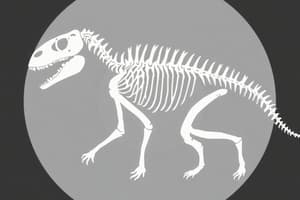Podcast
Questions and Answers
What is the branch of biology that deals with taxonomy?
What is the branch of biology that deals with taxonomy?
- Ecology
- Genomics
- Morphology
- Systematics (correct)
What is classification in biology?
What is classification in biology?
A grouping of organisms or objects based on a set of criteria.
What does taxonomy refer to?
What does taxonomy refer to?
The science of classifying.
What is phylogeny?
What is phylogeny?
What classification system did Aristotle use?
What classification system did Aristotle use?
What is Linnaeus' system of classification known for?
What is Linnaeus' system of classification known for?
What does binomial nomenclature consist of?
What does binomial nomenclature consist of?
What does morphological study focus on?
What does morphological study focus on?
What is the biochemical aspect in taxonomy?
What is the biochemical aspect in taxonomy?
What does cladistics model?
What does cladistics model?
What are ancestral characters?
What are ancestral characters?
What are derived characters?
What are derived characters?
What does the term taxon refer to?
What does the term taxon refer to?
What is a genus?
What is a genus?
What does family refer to in taxonomy?
What does family refer to in taxonomy?
What is an order in taxonomy?
What is an order in taxonomy?
What does class refer to in the taxonomic hierarchy?
What does class refer to in the taxonomic hierarchy?
What is a phylum in taxonomy?
What is a phylum in taxonomy?
What is the division term used for?
What is the division term used for?
What does kingdom refer to in taxonomy?
What does kingdom refer to in taxonomy?
What is a domain in biological classification?
What is a domain in biological classification?
What characterizes a character in biological terms?
What characterizes a character in biological terms?
What is a molecular clock?
What is a molecular clock?
What does a cladogram represent?
What does a cladogram represent?
What are eubacteria?
What are eubacteria?
What characterizes archeabacteria?
What characterizes archeabacteria?
What defines a protist?
What defines a protist?
What is a fungus in biological classification?
What is a fungus in biological classification?
Study Notes
Systematics and Classification
- Systematics studies taxonomy, organizing biological diversity.
- Classification groups organisms based on shared characteristics.
- Taxonomy is the science of categorizing organisms.
Evolutionary Concepts
- Phylogeny refers to the evolutionary history of species.
- Morphological studies involve analyzing shape and structure in organisms.
Historical Perspectives
- Aristotle classified organisms by size and structure, emphasizing morphology.
- Linnaeus developed binomial nomenclature, creating a systematic naming method.
Nomenclature and Taxonomic Hierarchy
- Binomial nomenclature consists of two parts: Genus and Species.
- Taxonomic hierarchy includes several ranks:
- Genus: closely related species sharing a common ancestor.
- Family: group of related genera, smaller than an order.
- Order: grouping of related families.
- Class: includes one or more related orders.
- Phylum: grouping of related classes.
- Kingdom: collection of related phyla or divisions.
- Domain: encompasses one or more kingdoms.
Evolutionary Features
- Characters in taxonomy include inherited morphological and biochemical traits.
- Ancestral characters are features found throughout a lineage's descent.
- Derived characters appear in present members but not in a common ancestor.
Molecular Analysis
- Molecular clock estimates phylogeny based on DNA sequence comparisons.
- Cladograms visually represent hypothesized evolutionary relationships.
Prokaryotic and Eukaryotic Groups
- Eubacteria have peptidoglycan in their cell walls, classifying them as prokaryotes.
- Archaebacteria are prokaryotes lacking peptidoglycan in their cell walls.
- Protists are diverse eukaryotes, including unicellular and multicellular forms, with variable cell wall composition.
- Fungi are eukaryotes that absorb nutrients, stationary, with chitin in their cell walls.
Studying That Suits You
Use AI to generate personalized quizzes and flashcards to suit your learning preferences.
Description
Test your knowledge on the key concepts of classification in biology with these flashcards. Learn about systematics, taxonomy, phylogeny, and Aristotle's system of classification. Perfect for anyone studying biology or preparing for exams.




